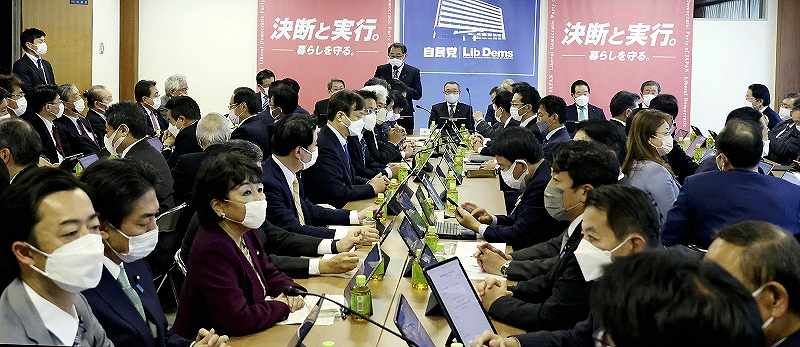Defense Perspective: Forward Reconnaissance / Details on tax hikes to fund defense spending still undecided

The LDP’s Research Commission on the Tax System meets on Dec. 15.
17:35 JST, December 25, 2022
Japan has come to a turning point with the approval of three defense- and security-related documents, including the new National Security Strategy. This is the third and last installment in a series examining the future direction of Japan’s security policy.
Prime Minister Fumio Kishida has unveiled a plan to significantly increase Japan’s defense spending to ¥43 trillion over five years, starting in fiscal 2023. But how will the government finance this increase?
On Dec. 16, the Liberal Democratic Party and its ruling coalition partner Komeito announced a fiscal 2023 tax reform outline, which one House of Councillors LDP lawmaker dubbed “a product of compromise,” as it specifies increases in three taxes — corporate, income and tobacco — but sets no time frame for the hikes.
On Dec. 8, Kishida instructed the two parties to work on the details of the increases. With only about a week left before the outline was to be announced, Yoichi Miyazawa, the chairperson of the LDP’s Research Commission on the Tax System, and other senior members of the commission were keen to include a specific timing for the hikes.
However, members opposed to tax increases due to concerns about their potential impact on the nation’s economic recovery criticized the move as too hasty. Economy, Trade and Industry Minister Yasutoshi Nishimura and Sanae Takaichi, minister for economic security, were among those who expressed opposition.
When opposition to tax increases within the LDP reached its peak on Dec. 13, the commission began to consider postponing the decision about a specific timing for the increases, with an eye on calming the situation, according to a senior commission member.
Careful preparations were made to placate those who opposed the increases. A document distributed to attendees at a commission meeting on the afternoon of Dec. 15 — the day before the tax reform outline was supposed to be decided — merely said that taxes would be raised at “an appropriate time in fiscal 2024 and beyond.”
Miyazawa also came up with another measure to appease the opposing members. Regarding the corporate tax hike, the document stipulated that tax breaks would be applied to income of up to ¥10 million yen.
However, during the meeting, Miyazawa unexpectedly proposed increasing this amount to ¥24 million yen, citing consideration for small and medium-sized companies. Doing so would reduce the number of companies hit by a tax increase.
The proposal had been shared among senior commission members the day prior to the meeting, and they tried to make it look as though Miyazawa’s proposal was a compromise.
The outline can be said to be a compromise agreement, in that supporters of the tax hike could say they were able to specify the rates for the three taxes, while opposing members insisted that the hikes were not yet decided. “It’s the LDP way of doing things,” a senior Komeito member said wryly.
A decision on the timing of the hikes was postponed this time around, and attention will now focus on when the ruling parties will hold discussions about the schedule for the increases. Usually, the ruling party tax panel begins full-fledged discussions sometime from November to the end of December.
However, the government and the ruling parties already are considering holding a meeting of the panel after next spring’s unified local elections.
The outline including the tax increase plan was decided after about a week of discussions, leading some to complain that there was insufficient time for party discussions. The government and the ruling parties intend to contain opposition by offering plenty of time for party talks by holding discussions in the spring, which is considered to be an unusual tactic.
“It’s a two-stage procedure,” a senior LDP member said. “ The outline has been decided this year and the details will be carefully discussed later.”
From a political point of view, it can be said that this approach allows the government and the ruling parties to gauge public opinion on defense-related tax hikes in the unified local elections before starting discussions. It seems they also hope to conclude talks on the tax hikes before 2025, when the term of office for House of Representatives members expires and the upper house election takes place.
Soaring energy and food prices are expected to slow the global economy next year, which could affect the Japanese economy. Additionally, there are no signs of an end to the coronavirus pandemic. If the opposition gains momentum due to an economic slowdown, discussions may become difficult.
In a report submitted to the prime minister in November, an expert panel convened by the government to comprehensively discuss Japan’s national defense capabilities said that politicians should squarely explain the need for society-wide cooperation and make efforts to obtain the public’s understanding in this regard.
The government and the ruling parties are tasked with the serious responsibility of carefully discussing ways to fund the defense budget and gain public understanding.
Top Articles in Politics
-

Japan PM Takaichi’s Cabinet Resigns en Masse
-

Sanae Takaichi Elected Prime Minister of Japan; Keeps All Cabinet Appointees from Previous Term
-

Japan’s Govt to Submit Road Map for Growth Strategy in March, PM Takaichi to Announce in Upcoming Policy Speech
-

LDP Wins Historic Landslide Victory
-

LDP Wins Landslide Victory, Secures Single-party Majority; Ruling Coalition with JIP Poised to Secure Over 300 seats (UPDATE 1)
JN ACCESS RANKING
-

Japan PM Takaichi’s Cabinet Resigns en Masse
-

Japan Institute to Use Domestic Commercial Optical Lattice Clock to Set Japan Standard Time
-

Israeli Ambassador to Japan Speaks about Japan’s Role in the Reconstruction of Gaza
-

Man Infected with Measles Reportedly Dined at Restaurant in Tokyo Station
-

Videos Plagiarized, Reposted with False Subtitles Claiming ‘Ryukyu Belongs to China’; Anti-China False Information Also Posted in Japan






















